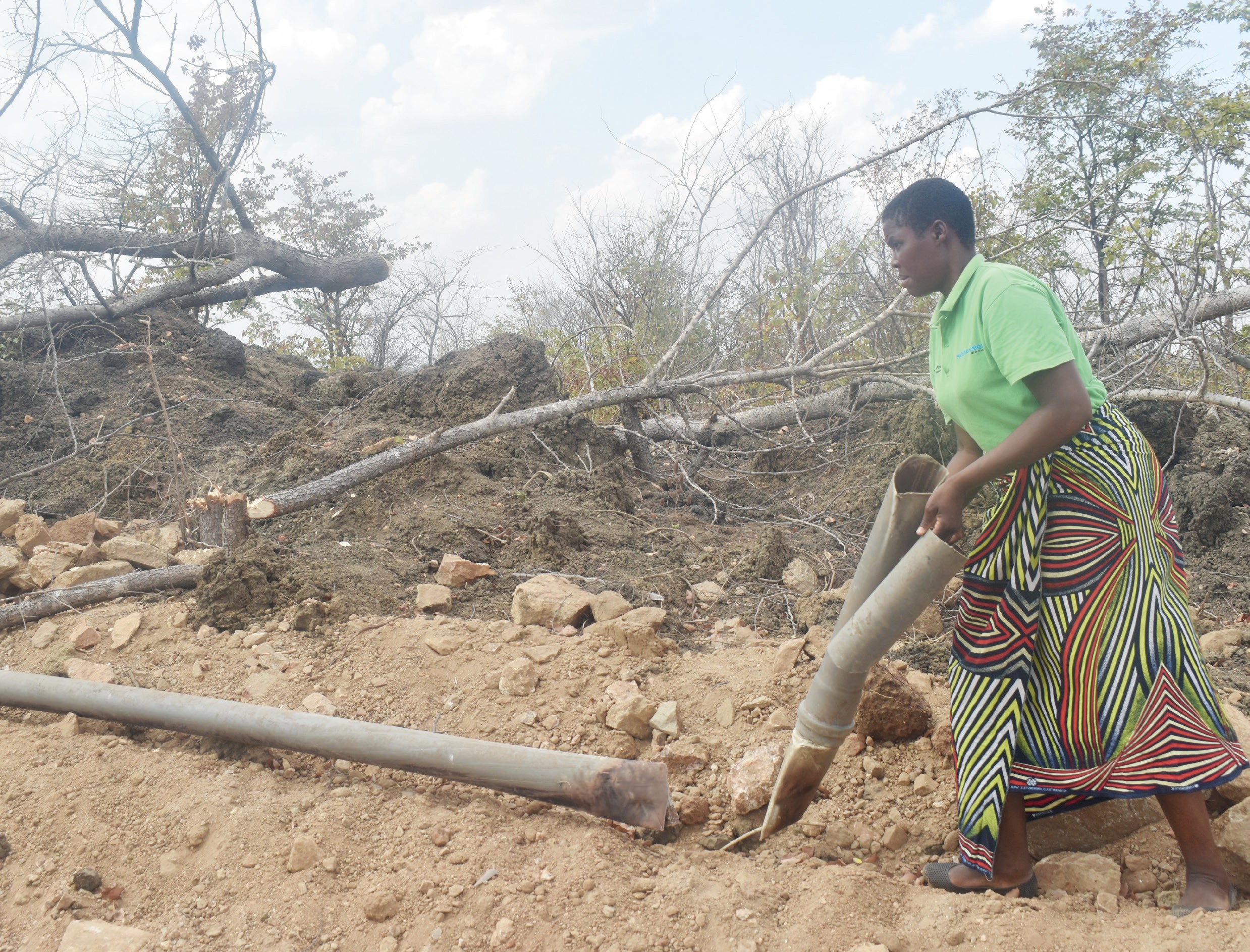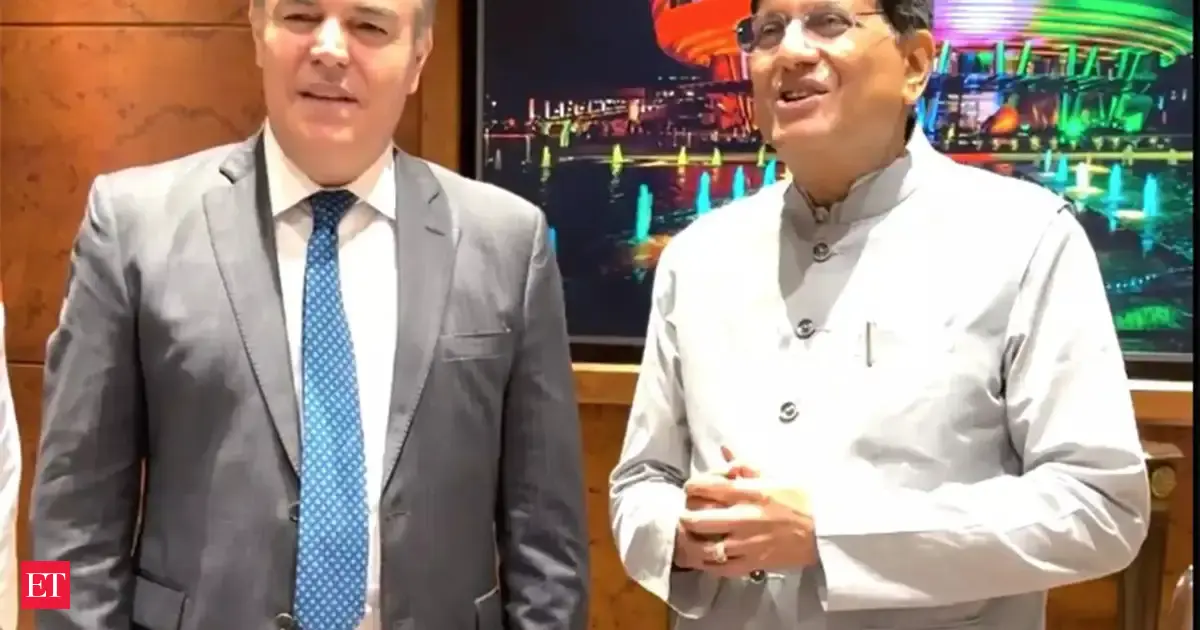By James Chavula
Copyright mwnation

Around 4pm on a sunny day, Alena Maseko of Makolera Village, Traditional Authority Chanthunya in Balaka District, disappeared into a well nearly double her height.
Its soft walls are crumbling bit by bit, further soiling the vanishing murky water at the bottom as she fills a bucketful a plateful at a time.
“This is my fourth trip today,” says the 42-year-old mother of four. “This has become an everyday chore since the taps suddenly run dry in March.”
Her family is among dozens that have been deprived of clean water for seven months since machines that are constructing a five-kilometre road off the M1 to the mineral-rich Kangankunde Hill ripped water pipes.
The damage caused by the rush for “high-grade rare earths” includes a pipeline from Mpira Dam in neighbouring Ntcheu District.
It supplies water to the drought-prone community marked with fast-disappearing woodlands.
The local community blames Lindian Resources Limited, a mining firm listed on the Australian Stock Exchange, for ignoring the damage caused by its contractor, Mota-Engil from Portugal.
“We complained to the mining company and Balaka District Council who assured us to urgently replace the pipes, but it’s over half a year and they don’t seem to care about us,” Maseko states.
Collateral damage
The chopped pipeline was a lifeline for the villagers on the receiving end where rainfall is scanty and open wells and boreholes frequently dry amid climate change.
“Here, water points are far apart. Piped water from communal taps was safe, reliable and easy to get. Since March, I’ve had to walk or cycle beyond my village to fetch water from crowded hand pumps,” says Precious Chauluka, 20, from Ebulo Village along the boundary between Balaka and Ntcheu.
“A one-way trip to the communal borehole takes 10 minutes on a bicycle and 40 by foot. I make at least five round trips to fetch enough water for my grandmother and I. Those who cannot stand the long travels and jostling go to the open wells,” says Chauluka.
Since February, machines have been tearing the waning natural forest and breaking ground to accelerate access to the rare earths’ deposits used in electronic appliances, including phones, computers and renewable energy accessories.
This is “a key milestone in the delivery of one of the world’s most significant undeveloped rare earth assets”, Lindian Resources announces on its website.
To its project delivery chairperson Zac Komur, the early engineering works illustrate Lindian’s “dedication to progressing Kangankunde with both urgency and a fresh perspective”.
“We are establishing a strong groundwork for effective project execution…whilst fast-tracking the development of Kangankunde,” he says in the online statement.
After years of drilling samples, the company has discovered enough rare earths ore to mine at least 15 300 tonnes annually for at least 45 years.
‘Locals’ lives matter’
However, the local communities want the mining company to make their health and well-being part of the deal.
“Water is life. We want the company to restore piped water supply.Our lives matter too,” says Chauluka.
The breakdown in access to safe water, sanitation and hygiene has stirred fear of cholera eruption in the prone community. The semi-arid zone was one of the hotspots of Malawi’s deadliest outbreak which killed 1 760 of 58 944 confirmed patients between March 2022 and August 2023.
The fierce scrambles for crowded hand pumps and murky wells stream also represents a slump in access to safe water.
A new government pol i cy promotes piped water supply systems to accelerate the national push for universal access among Malawi’s rural majority by 2030.
In the dry streams, women and children are seen drawing soiled water from wells opened by farmers for irrigating vegetable beds on the fertile alluvial riverbank.
Some women say the water changes colour due to pesticides and irate farmers threaten to poison their wells to save water for crops.
‘We are aware, but…”
Weekend Nation has asked Lindian Resources why it has taken months to restore water supply.
We also inquired how the mining company is investing in neighbouring communities likely to bear social and environmental impacts of mining.
The firms’ community relations department confirmed that managing director Trevor Hiwa has seen our inquiry and the company would “get back” accordingly.
“Kindly note that we are aware of the issue of water pipes and measures are already in place. I will have to seek clearance and an approval on the other issues you have raised and the information you require,” reads the reply via e-mail.
We also asked Balaka District Council water development officer Emmanuel Nkhonjera for the local government’s role in the hiccup.
He says his office has “little or no say” as the mining firm mostly deals with the lands office.
However, Nkhonjera states: “The destruction of water pipes is a genuine concern and people are suffering.
“We visited the area three or four months ago to assess the situation and recommended a solar-powered system to pipe water to the affected villages while waiting to fix the broken system, but later agreed that the mining company should drill boreholes as a temporary measure,” he says.
Nkhonjera says the company has since drilled two boreholes for families displaced by the mine under construction—but this community investment came before the pipes were uprooted, locals retorted.
“We took our concerns to the district commissioner. Now some affected families feel the inaction could be a silent tact to force us out. However, relocation or resettlement has to be negotiated in good faith,” says Women Forum member Estella Maseko.
According to United Nations principles, a mining company must obtain free, prior and informed consent from indigenous communities when pursuing projects on their ancestral lands.
The call for responsible, ethical land use loomed large at the April session of the Permanent Forum on Indigenous Issues, a high-level advisory body to the UN Economic and Social Council.
Just transition
ActionAid Malawi is working with the Natural Resources Justice Network (NRJN) to promote just transition for communities heavily affected by climate change and mining in Balaka and Nkhotakota districts. The year-long initiative, funded by SwedBio through ActionAid South Africa, seeks to address environmental degradation, displacement, gender-based violence, rights violations and health hazards.
The coalition of 45 civil society organi sations, asks Lindian Resources to stop neglecting its duty to repair the water pipes it damaged.
“This is inhumane, a shocking disregard of human life. It violates the UN guiding principles on business and human rights, the Constitution of Malawi which guarantees the right to life, dignity and development,” says NRJN national coordinator Kennedy Rashid.
He urges all mining investors to respect human rights and contribute to national sustainable development goals.
The activist states that denying people access to clean water undermines the attainment of global Sustainable Development Goals (SDGs), including sanitation, hygiene, good health and ending inequalities.
“As a civil society network, we demand immediate restoration of piped water supply, transparent engagement with communities and government oversight. The company must comply with its obligations as outlined in its environmental and social impact assessment,” he says.
Concurring, Balaka Civil Society Network mining focal person Gift Mtupa says the incident reveals “a disturbing disregard for locals’ well-being”.
He explains: “Access to clean water is a fundamental human right and it’s unacceptable that a company profiting from our natural resources can’t ensure basic necessities for the communities affected by its operations.
“While waiting to replace the pipes after completing road construction, the company should provide alternative water supply to the affected communities and continuously monitor its environmental and social impact management to prevent similar disruptions.”
The disruption worsens Balaka’s water stress amid climate change.
In 2018, drought reduced the silted Mpira Dam to a record low, leaving taps dry in the semi-arid district.
As machines clear the way for mining, illegal loggers raid natural forests for charcoal and firewood, endangering both surface water and the rivers underground.
Policy question
However, women and children who do the work of pipes—bringing water home—are more worried about the cut-off pipes.
From the earth road under construction, they can be seen returning from the streams and crowded hand pumps with water on their heads.
The new National Water Policy seeks to make these sights history.
The shift from boreholes was conceived to accelerate access national progress to achieve SDG6: Safe water for all by 2030
“A typical borehole fitted with a hand pump serves up to 250 people each, but we want every tap serving 150 to cut the long travels and waiting periods. The entire trip—to and from a water point—should not exceed 30 minutes,” says Secretary for Water and Sanitation Elias Chimulambe.
Maseko spends about the same duration—half an hour—to fill a 20-litre bucket as others wait for a turn.
Scooping water from the well a plateful at a time, she regrets slipping back to “the agony the gravity-fed piped water supply was meant to eliminate.
“This suffering evokes memori es of the year Mpira Dam dried up. We are spending more time fetching water than taking care of our families, crops and businesses. Sadly, many people cannot af ford fuelwood for boiling unclean water or water chemicals for removing germs,” she narrates.
Faines Milesi, 63, shakes her head disapprovingly when asked about the lingering uncertainty. It hits her differently.
She gave a flashback: “I was born in 1962 when we had no choice but to drink water from unprotected wells. In 1977, the government extended the pipe from Mpira Dam to our area to end cholera.
“It breaks my heart to revert to the well and carry home a bucketful of unclean water. I ask myself: Why has the mining company forsaken us? Is it because we are poor and voiceless?”



